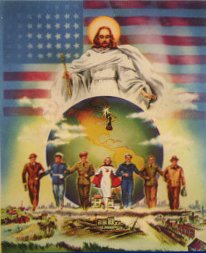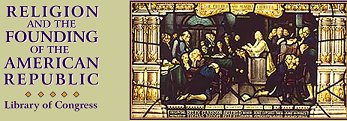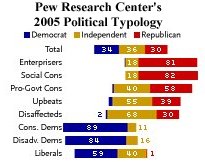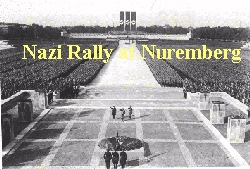THE SOCIAL PSYCHOLOGY OF
POLITICAL REGIMES
[the nation state] offers most of its members a stronger
sense of security, belonging or affiliation, and even personal identity,
than does any alternative large group ...[The] greater the need of the
people for such affiliation and identity under the strains and shocks of
social mobilization and alienation from earlier familiar environments,
the greater becomes the potential power of the nation-state to channel
both their longings and resentments and to direct their love and hate.
--Karl Deutsch, Contemporary Political
Science:
Toward Empirical Theory, 1967:271
Over the past two decades, mergings of psychologists
and political scientists have taken place to yield the field of political
psychology. The union was inevitable. Indeed, modern political systems
routinely shape the identities, memories, stereotypes, beliefs, language,
emotions, and actions of their citizens. A sample of research topics:

ON THE PERSONAL NEEDS GIVING RISE TO
POLITICAL ORDERS
With social evolution, modern political systems have
become increasingly responsible for addressing individuals' needs for safety,
order, meaningfulness, and well-being. With modernization, for instance,
political regimes have become the collective
instrument for controlling all forms of deaths and for managing cultural
death fears as well. Given the contemporary political involvements
with abortion, suicide prevention, warnings of contaminated food and the
risks of smoking, and homicide, it should be evident that polities have
become responsible for preventing most forms of premature, man-made (and
hence avoidable) death. But political responsibility now extends to protection
from death by the natural order as well. Following an earthquake (the prediction,
 itself, is a political responsibility, much like the weather), for example,
we no longer appeal to God as did Job but rather call Washington for relief.
Even the contemporary manifestations of cultural death fears have become
politicized, including not only the politically-sponsored radioactive mushroom
clouds, but fears of cancer and gray hair as well. Now as we witness the
defense budgets of developed nations being dwarfed by their expenditures
devoted to those most likely to die, the sick and the old, we can detect
a more subtle yet profound involvement with death by modern political economies.
Well over one-half of the U.S. federal budget is devoted either to refining
the instruments of death (e.g., the military), preventing death (e.g.,
environmental control and cleanup; paying for nearly one-third of the nation's
health care bill; and its promotion of air and auto safety), or assisting
those most likely to die (between the 1960s and 1980s, the portion of the
federal budget going to those 65 and older increased from 15 to 28 percent
(with between 25 and 35 percent of Medicare expenditures going to the 5
to 6 percent of enrollees who die during the year). Such involvements in
the battle against death have come at a cost: the state increasingly monopolizes
the use of legitimate force.
itself, is a political responsibility, much like the weather), for example,
we no longer appeal to God as did Job but rather call Washington for relief.
Even the contemporary manifestations of cultural death fears have become
politicized, including not only the politically-sponsored radioactive mushroom
clouds, but fears of cancer and gray hair as well. Now as we witness the
defense budgets of developed nations being dwarfed by their expenditures
devoted to those most likely to die, the sick and the old, we can detect
a more subtle yet profound involvement with death by modern political economies.
Well over one-half of the U.S. federal budget is devoted either to refining
the instruments of death (e.g., the military), preventing death (e.g.,
environmental control and cleanup; paying for nearly one-third of the nation's
health care bill; and its promotion of air and auto safety), or assisting
those most likely to die (between the 1960s and 1980s, the portion of the
federal budget going to those 65 and older increased from 15 to 28 percent
(with between 25 and 35 percent of Medicare expenditures going to the 5
to 6 percent of enrollees who die during the year). Such involvements in
the battle against death have come at a cost: the state increasingly monopolizes
the use of legitimate force.
Other costs have accrued given state involvements with
other need systems. Consider the following table. In late 1989 the Soviet
people were asked whether the state should be mainly responsible for people's
success and well-being or whether people should look out for themselves
and decide for themselves what to do for success in life (Source: Emory
University survey of 2,485 Soviet citizens, interviewed by the National
Center for Public Opinion in Moscow; cited in New York Times, March
29, 1990:A6).
SOVIET REPUBLIC/
R's AGE |
STATE RESPONSIBLE |
INDIVIDUAL RESPONSIBLE |
NO ANSWER |
| Georgians |
75%
|
23%
|
1%
|
| Russians |
46%
|
45%
|
9%
|
| Balts |
39% |
52% |
9% |
| Central Asians |
38% |
57% |
6% |
| TOTAL |
46% |
45% |
9% |
| Under 25 |
41% |
50% |
9% |
| 25-29 |
46% |
49% |
5% |
| 30-59 |
47% |
43% |
10% |
| 60+ |
50% |
41% |
9% |
Can you predict in what areas and among what age groups
of the former U.S.S.R. that communism's demise was least appreciated? What
parallels are there between these findings and attitudes of Americans toward
the welfare state?
POLITICAL SHAPINGS OF COLLECTIVE
PERCEPTIONS, EMOTIONS AND BELIEFS
 A further dilemma of democratic government in our time
arises from the fact that techniques for appealing to sub-rational and even
to subconscious levels of human motivation are still in their infancy when
applied to politics. Liberal democratic theory assumed human rationality
and discounted the passions; but psychologists and social scientists no
longer believe that men are ruled by reason, while advertisers and military
men know they are not.
A further dilemma of democratic government in our time
arises from the fact that techniques for appealing to sub-rational and even
to subconscious levels of human motivation are still in their infancy when
applied to politics. Liberal democratic theory assumed human rationality
and discounted the passions; but psychologists and social scientists no
longer believe that men are ruled by reason, while advertisers and military
men know they are not.
--William McNeill, The Rise of the
West,
1961
 In The Presidential Character (1972), James
Barber develops how modern political regimes must respond to a "climate
of expectations," which includes the public's needs for reassurance,
sense of progress and action, and legitimacy. In 1996 this "climate"
featured disenchantment, disconnectedness, and cynicism, leading to the
lowest Presidential election turnout since 1924. Since
1973, with the exception of 1974 (the midst of the Watergate crisis), public
confidence in the leadership of Congress and the Executive Branch has never
been lower.
In The Presidential Character (1972), James
Barber develops how modern political regimes must respond to a "climate
of expectations," which includes the public's needs for reassurance,
sense of progress and action, and legitimacy. In 1996 this "climate"
featured disenchantment, disconnectedness, and cynicism, leading to the
lowest Presidential election turnout since 1924. Since
1973, with the exception of 1974 (the midst of the Watergate crisis), public
confidence in the leadership of Congress and the Executive Branch has never
been lower.
POLITICAL POWER AND ITS LEGITIMATION

The central function of the state is its maintenance
of order. Historically this has been achieved through its monopoly over
the use of force. If modern political regimes cannot control a people by
direct force then they must control how they think--particularly in democracies,
which is why the United States has long had an advanced public relations
industry. It is also why nation-states require the political socialization
of their young in their schools' curriculums.
Strong must be the ideology legitimating those at the
throttles of power. But what is an ideology? In part, it is an interpretative
framework that integrates and gives consistency to individuals' wide-ranging
experiences, beliefs and values, and that organizes their social drives.
Consider, for instance, the 1992 Republican logic that working mothers
have contributed to the moral breakdown of the country that, in turn, is
the cause of high crime rates and increasing cynicism in American
society.
 The collective memories occasioned by the thirty-third
anniversary of President John F. Kennedy's assassination featured the latest
of the conspiracy theories. Framed by Oliver Stone's "JFK" and
"Nixon" movies, stories of the Government using American
citizens as unwitting guinea pigs, and stories of Government disinformation
campaigns and lies concerning the exposure of U.S. troops in the Gulf
War to Iraqi chemical and biological agents, one wonders what if the CIA
and other agencies were found to indeed found to have been involved in
the President's murder. What would be the implications if Americans' reactions
were "So what? What else is new?"
The collective memories occasioned by the thirty-third
anniversary of President John F. Kennedy's assassination featured the latest
of the conspiracy theories. Framed by Oliver Stone's "JFK" and
"Nixon" movies, stories of the Government using American
citizens as unwitting guinea pigs, and stories of Government disinformation
campaigns and lies concerning the exposure of U.S. troops in the Gulf
War to Iraqi chemical and biological agents, one wonders what if the CIA
and other agencies were found to indeed found to have been involved in
the President's murder. What would be the implications if Americans' reactions
were "So what? What else is new?"

 Return to Social Psychology
Index
Return to Social Psychology
Index









